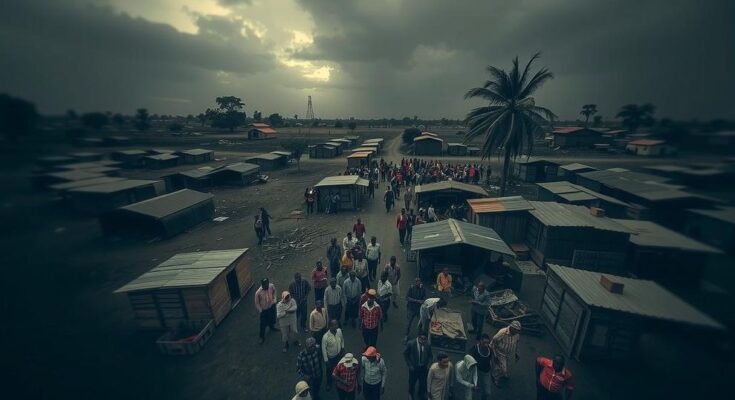The ongoing civil conflict in Sudan has led to the displacement of over 14 million people, with significant reports of sexual violence predominantly against women. The situation has become the world’s largest displacement crisis in 2023, characterized by extensive humanitarian needs and a potential for increased regional instability. Both the military and paramilitary forces are accused of committing war crimes, highlighting the urgent necessity for international humanitarian assistance.
Sudan is experiencing an unprecedented humanitarian crisis fueled by ongoing civil conflict, resulting in the displacement of over 14 million individuals, with a significant increase in sexual violence against women and girls. The situation has been characterized as the world’s largest displacement crisis in 2023, according to the United Nations’ International Organization for Migration (IOM). A recent report by the UN’s Independent International Fact-Finding Mission highlights the dire plight, particularly for women, who are facing abductions and sexual slavery by paramilitary groups. The civil war, which erupted in April 2023 due to a power struggle between the Sudanese Armed Forces (SAF) and the Rapid Support Forces (RSF), has created conditions that have forced approximately 30 percent of the population to flee their homes. Among the displaced, 11 million are internally displaced persons (IDPs) while 3.1 million have sought refuge in neighboring countries. The magnitude of the crisis continues to escalate as hunger, disease, and violence permeate the living conditions in Sudan. IOM Director-General Amy Pope remarked on the catastrophic state within Sudan stating, “There is simply no other way to put it. Hunger, disease and sexual violence are rampant. For the people of Sudan, this is a living nightmare.” The vast majority of the displaced population comprises women and children, exacerbating the vulnerabilities faced amid this horrific conflict. Research indicates that both the military and RSF have perpetrated large-scale human rights abuses, many of which are considered war crimes. The fact-finding mission’s report emphasizes that the RSF has been primarily responsible for a significant portion of the sexual violence reported, highlighting grave incidents including gang rapes and forced abductions. In addition to widespread violence, the civil war has led to conditions resembling famine in certain regions, particularly in North Darfur. IOM’s report cautions that approximately 25 million people—over half of Sudan’s population—may be facing acute food shortages by the year’s end. Despite the alarming circumstances, the funding for humanitarian aid remains insufficient, with only a fraction of the needed support secured thus far.
The civil conflict in Sudan, which erupted in April 2023, arose from a struggle for power between the Sudanese Armed Forces and the Rapid Support Forces, which were previously allied. Following a military coup that ousted former President Omar al-Bashir in 2019, the relationship between these factions deteriorated, leading to violent confrontations. The UN has referred to this conflict as creating the largest displacement crisis globally this year. The ongoing violence and malnutrition have severely impacted the civilian population, necessitating urgent international attention and aid responses to mitigate the humanitarian toll.
The situation in Sudan remains critical, with millions of individuals facing displacement, hunger, and violence. Urgent humanitarian action is required to alleviate the suffering of the Sudanese people and to prevent further regional instability. The international community must not overlook the desperate conditions faced by the population, particularly women and children, who bear the brunt of the conflict’s atrocities. Immediate engagement and funding for humanitarian aid are essential to support the affected individuals.
Original Source: www.aljazeera.com




